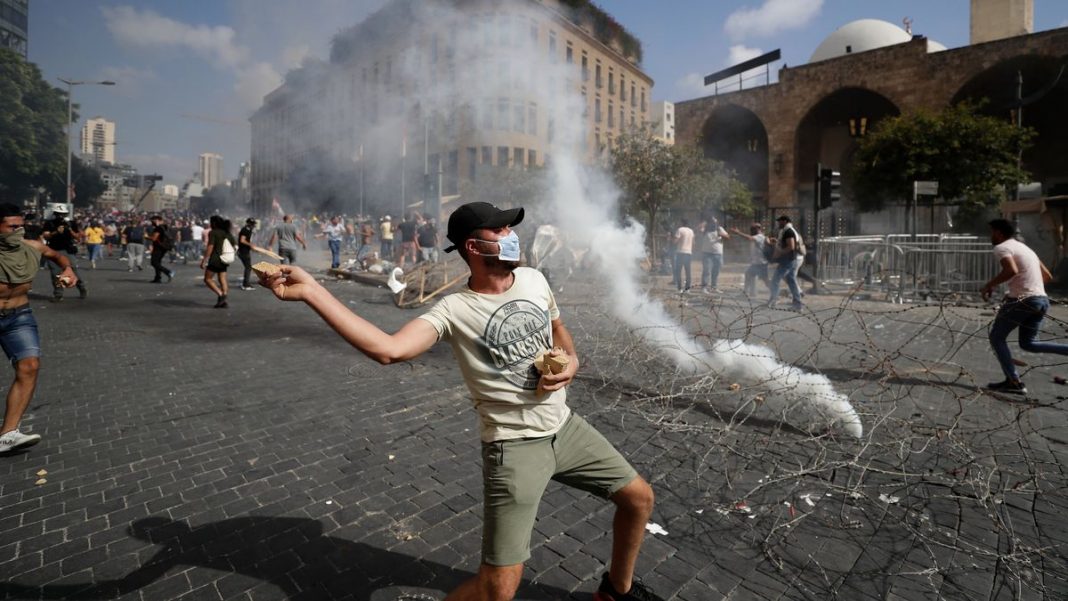Two members of Lebanon’s government have quit over a deadly blast that unleashed public rage against the country’s ruling class, with protesters and police fighting running battles in the capital for a second day. The Lebanese government is blamed largely for the explosion by the public.
As hopes faded of finding any survivors of Tuesday’s explosion, information minister Manal Abdel Samad and environment minister Damianos Kattar both announced their resignations Sunday, in a further hit to the embattled government of Prime Minister Hassan Diab.
Enormous catastrophe and a sterile regime
Calling the explosion an “enormous catastrophe”, Kattar said he had lost hope in a “sterile regime that botched several opportunities”.
Several MPs also quit and local media reported Diab was mulling announcing the entire government’s resignation, a day after protesters briefly occupied and ransacked government ministries.
Read more: Why is IMF unwilling to help Lebanon amid worsening economic crisis?
Hundreds gathered again in and around Martyrs’ Square, a short walk from the port where the devastating explosion occurred, killing at least 158 people and injuring a staggering 6,000, many bloodied by flying glass.
“Those who died paid the price of a state that doesn’t care about anything except power and money,” said protester Tamara, 23, whose friend Rawan, 20, was killed in the blast.
“It’s not enough that ministers resign,” said her friend Michel.
“Those who put the explosives there must be held accountable. We want an international tribunal to tell us who killed (Rawan).”
Police later fired tear gas in an attempt to disperse protesters who hurled stones and let off fireworks near a street leading to parliament, AFP correspondents said.
Many wore helmets and gas masks, some wielded makeshift shields and others rushed to pick up smouldering tear gas shells and threw them back towards police.
The government did reponsibe?
While it is not known what started the fire that set off a huge stockpile of ammonium nitrate, protesters say the disaster could not have happened without the corruption and incompetence that have come to define Lebanon’s ruling class.
Read more: France: 250 million euros emergency aid pledged for Lebanon
A picture went viral online showing the city’s devastated port, with a low wall in the foreground bearing the spray-painted message: “My government did this.”
"Lebanon's elites, who are directly or indirectly responsible for this tragedy, should not be allowed to use international aid as a life vest to save themselves from scrutiny" — writes @macaronjoe for #AJOpinion https://t.co/lrXMDiV0PC
— Al Jazeera English (@AJEnglish) August 10, 2020
The disaster has revived anger at a ruling class seen as living in luxury while millions endure job losses, deepening poverty, power blackouts and garbage mountains piling up in the streets.
The Lebanese army had “fading hopes” of finding any more survivors, Colonel Roger Khoury told reporters Sunday.
The Lebanese government has however not sought responsibility for the explosion.
Human Rights Watch’s Lebanon researcher Aya Majzoub said some security forces had indiscriminately fired tear gas and rubber bullets at protesters.
“Instead of deploying the army to help residents clear rubble from their homes, businesses, and communities, the Lebanese authorities chose to deploy them and other security forces against protesters.”
Saturday’s violence injured 65 people, the Lebanese Red Cross reported, while lawyers supporting protesters said security forces made 20 arrests.
The August 4 explosion came as Lebanon was already reeling from an economic crisis that has seen its currency collapse, plunging swathes of its population into poverty, and struggling with a spike in coronavirus cases.
Investigations under way
On Sunday, French President Emmanuel Macron oversaw a UN-backed virtual donor conference that pledged 250 million euros ($294 million) in aid for the cash-strapped country, where some 300,000 people were rendered homeless by the disaster.
In a joint statement, donors pledged the assistance would be “directly delivered to the Lebanese population” under the supervision of the UN.
The UN said about $117 million would be needed over the next three months for health services, emergency shelter, food distribution and programmes to prevent the further spread of COVID-19, among other interventions.
The donors also offered support for an “impartial, credible and independent inquiry” into the disaster — something Lebanese President Michel Aoun has dismissed, saying it would only “dilute the truth”.
Read more: Lebanon president rejects international investigation into Beirut port blast
US President Donald Trump urged Lebanese authorities “to conduct a full and transparent investigation, in which the United States stands ready to assist”.
The revelation that Lebanese state officials had long tolerated a ticking time-bomb in the heart of the capital has served as shocking proof to many Lebanese of the rot at the core of the state apparatus.
Diab said Saturday he would propose early elections to break the impasse that is plunging Lebanon ever deeper into political and economic crisis. the Lebanese government has however sought to downplay the explosion but as the death toll rises so does the scrutiny.
Parliament speaker Nabih Berri called a meeting of the legislature on Thursday “to question the government on the crime that struck the capital”, state media said.
Politics in multi-confessional Lebanon is dominated by former warlords from the 1975-1990 civil war who have exchanged their military fatigues for suits, or were replaced by relatives.
While there are Sunni Muslim, Christian and myriad other groups, the most powerful is the Shiite Hezbollah movement.
AFP with additional input by GVS News Desk














